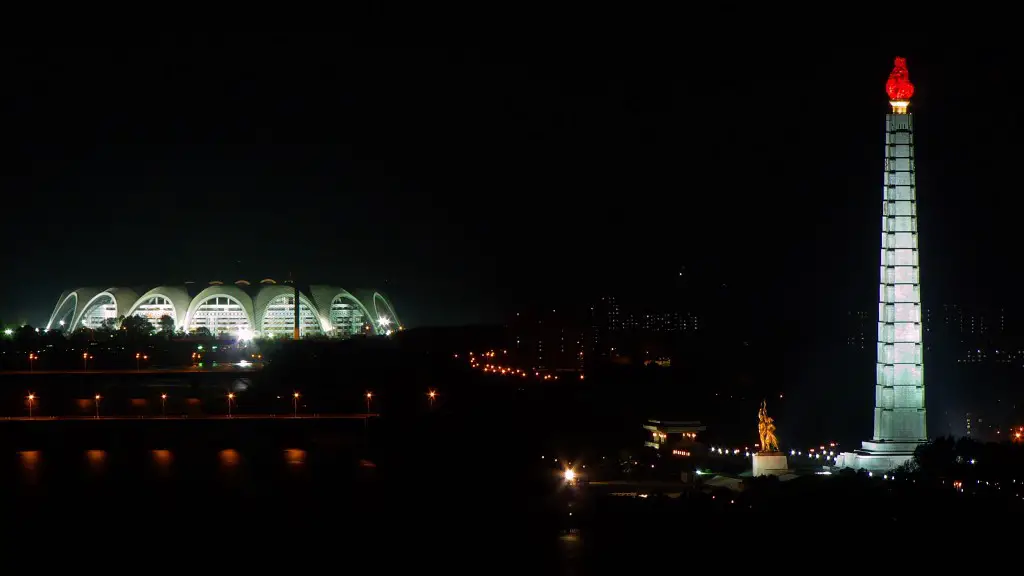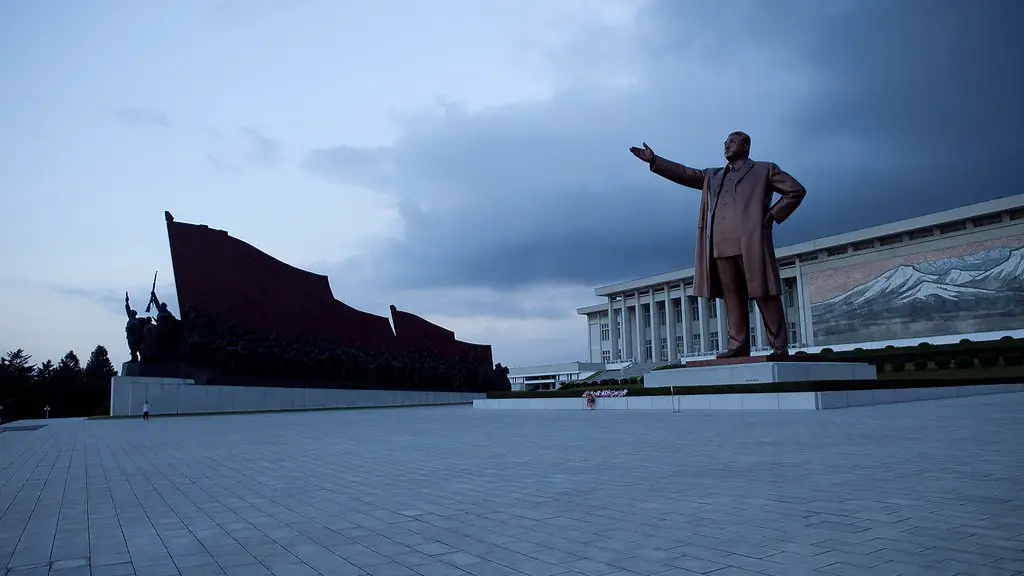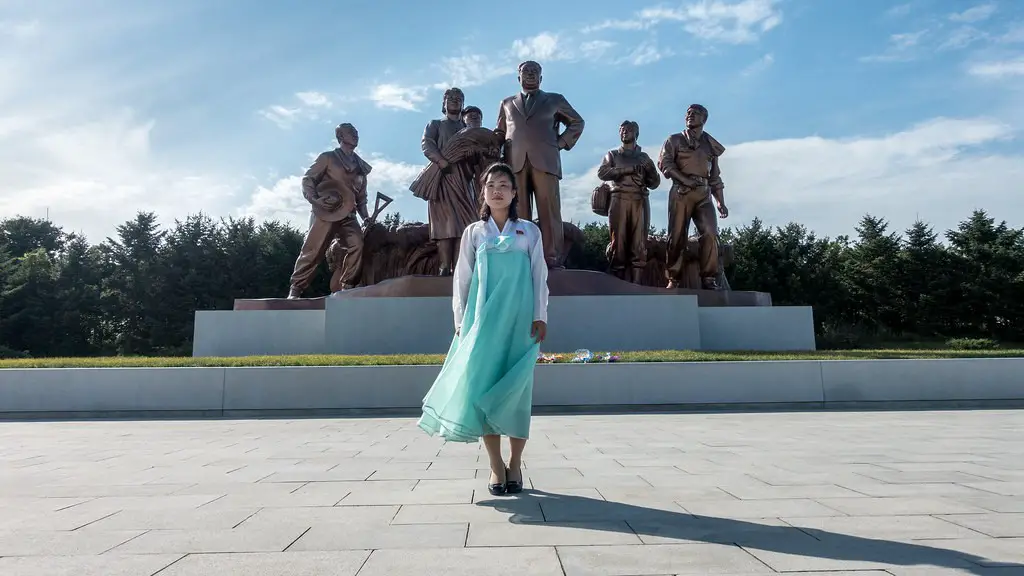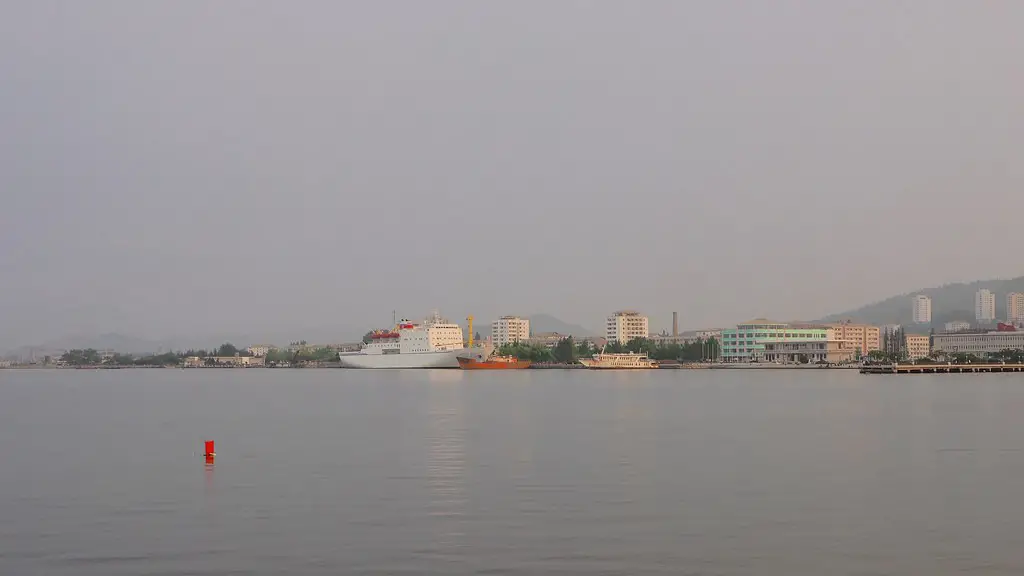Early History
Before Korea split into North and South, it was unified as a single country ruled by an imperial dynasty. The Yi dynasty was established in 1392 and lasted until 1910, when Japan annexed Korea. During this time, the peninsula was divided into eight provinces, each with a governor administering their respective area. After Japan’s surrender in 1945, Korea was divided between the North and South, with the United States occupying and controlling the southern half of the peninsula and the Soviet Union occupying and controlling the northern half.
The Korean War
In 1950, North Korea and the Soviet Union invaded South Korea, starting the Korean War, which lasted until 1953. During the war, the United States and United Nations supported South Korea and the Soviet Union and China supported North Korea. In 1953, an armistice was signed and the two sides agreed to a ‘demilitarized zone’ (DMZ), which is still in place today and marks the border between North and South Korea.
North Korean Government
North Korea is a single-party state, ruled by the Democratic People’s Republic of Korea (DPRK), which is headed by the dictator Kim Jong-Un. The government is characterized by a personality cult and extreme censorship. Freedom of expression and media is heavily restricted and only outlets that are loyal to the North Korean government are allowed.
North vs. South Korea
Since the split, the two countries have been vastly different. South Korea is a democracy with a market economy and has made major advances in terms of human rights, education, and technology. North Korea, on the other hand, is a totalitarian state with a centrally planned economy and an extremely poor human rights record. Additionally, South Korea is a member of the United Nations and is much more connected to the global economy, while North Korea is a completely isolated country.
The North Korean Economy
The North Korean economy is based on state control of industry and agriculture as well as foreign aid. It is estimated that the North spends up to one third of its GDP on its military, which is the 4th largest in the world. International sanctions have crippled the economy and led to major shortages of food, fuel, and medicine.
North Korean Nuclear Program
Since the late 1980s, North Korea has been developing its nuclear weapons program, which it believes is necessary for its defense against the US and South Korea. In 2017, North Korea conducted its sixth nuclear test, which was its most powerful to date. In 2018, North Korea and South Korea met for the first time in over a decade, signaling a newfound willingness to engage in talks. Since then, North Korea has stated that it is willing to give up its nuclear weapons program in exchange for security guarantees.
US Relations with North Korea
Since the Korean War, the US has maintained a firm stance against North Korea. In recent years, however, the Trump administration has adopted a more conciliatory approach, with President Trump and Kim Jong Un meeting in 2018. Despite these talks, the US and North Korea have continued to be at odds, with North Korea rebuffing US attempts to convince them to give up their nuclear weapons and the US continuing to impose economic sanctions.
Analysis of the Separation
The division of Korea into North and South has had far-reaching consequences for both countries, as well as for the international community. North Korea has developed into a totalitarian and isolated state, with a crumbling economy and a nuclear arsenal, while South Korea has blossomed into a wealthy and democratic nation, deeply connected to the global economy. It remains to be seen whether the two Koreas can reconcile and move towards a unified peninsula.
Current Situation
Although North Korea and South Korea have both expressed a willingness to reach a peace agreement, progress has been slow. North Korea is adamant that they will not give up their nuclear weapons, while South Korea is unwilling to accept a nuclear-armed North Korea. The international community is also deeply divided, with some countries like China taking a softer stance on North Korea and others, like the US, continuing to impose sanctions.
North Korea’s Human Rights Violations
North Korea’s human rights record is one of the worst in the world. It has been accused of numerous human rights violations, ranging from torture and execution to forced labor and ‘crimes against humanity’. North Korea also has a system of labor camps, where individuals deemed to be enemies of the state are detained and subjected to inhumane conditions. Due to the isolation of the country and lack of access to the outside world, it is difficult to know the full extent of the human rights abuses.
International Response
The international community has responded to the human rights abuses in North Korea with a mixture of condemnation and engagement. In recent years, there has been an increasing emphasis on dialogue and diplomacy as a way to bring about peaceful change. The UN, as well as various human rights organizations, have also taken an active role in advocating for better rights for North Koreans, with some limited success.
Economic Impact
The economic impact of the separation of North and South Korea has been immense. South Korea is one of the most advanced countries in the world and a leader in the global economy. By contrast, North Korea’s economy is heavily reliant on foreign aid and has suffered from crippling economic sanctions. North Korea’s economic development has been held back by a lack of investment and international trade, as well as the harsh economic sanctions.
United States’ Involvement
The US has been an active participant in the Korean conflict, both before and after the separation of North and South Korea. Since the 1950s, the US has maintained a strong presence in South Korea and has provided economic, military and political support. The US has also been a vocal critic of North Korea, leading international efforts to impose economic sanctions and pressure the North Korean government to end its nuclear weapons program.



